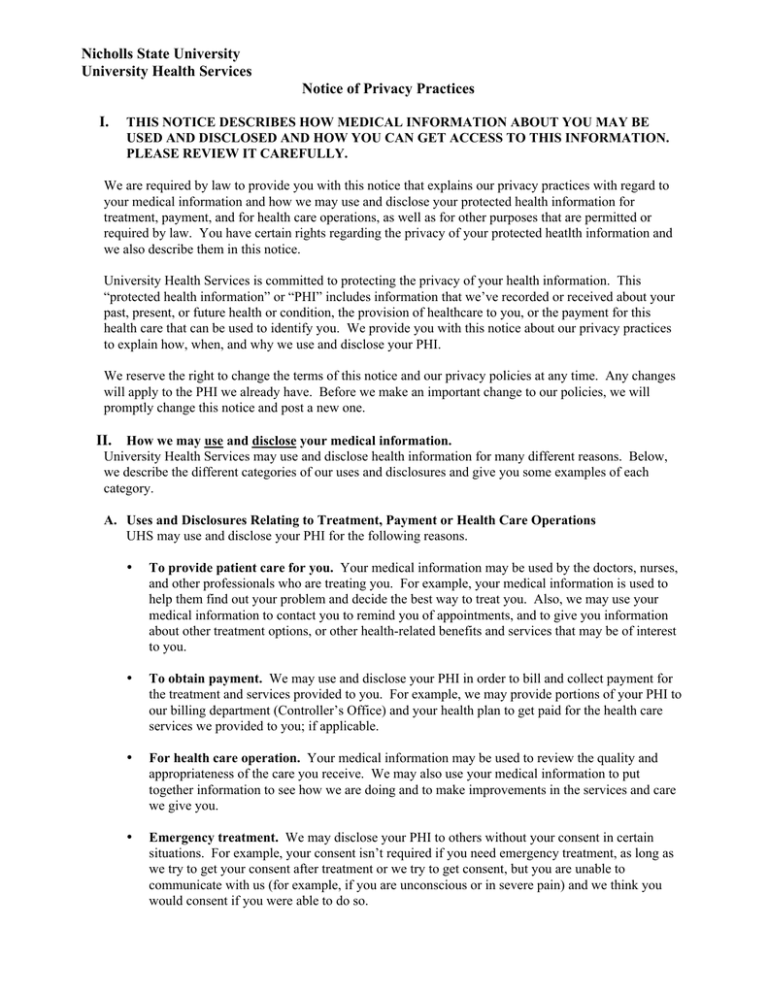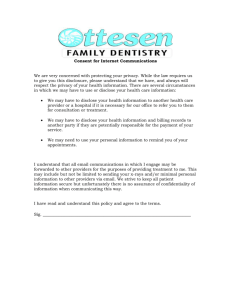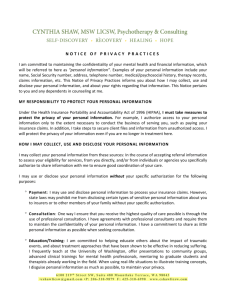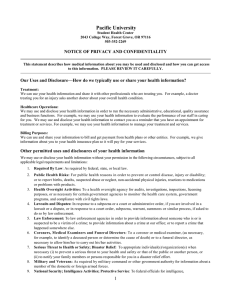Nicholls State University University Health Services Notice of Privacy Practices
advertisement

Nicholls State University University Health Services Notice of Privacy Practices I. THIS NOTICE DESCRIBES HOW MEDICAL INFORMATION ABOUT YOU MAY BE USED AND DISCLOSED AND HOW YOU CAN GET ACCESS TO THIS INFORMATION. PLEASE REVIEW IT CAREFULLY. We are required by law to provide you with this notice that explains our privacy practices with regard to your medical information and how we may use and disclose your protected health information for treatment, payment, and for health care operations, as well as for other purposes that are permitted or required by law. You have certain rights regarding the privacy of your protected heatlth information and we also describe them in this notice. University Health Services is committed to protecting the privacy of your health information. This “protected health information” or “PHI” includes information that we’ve recorded or received about your past, present, or future health or condition, the provision of healthcare to you, or the payment for this health care that can be used to identify you. We provide you with this notice about our privacy practices to explain how, when, and why we use and disclose your PHI. We reserve the right to change the terms of this notice and our privacy policies at any time. Any changes will apply to the PHI we already have. Before we make an important change to our policies, we will promptly change this notice and post a new one. II. How we may use and disclose your medical information. University Health Services may use and disclose health information for many different reasons. Below, we describe the different categories of our uses and disclosures and give you some examples of each category. A. Uses and Disclosures Relating to Treatment, Payment or Health Care Operations UHS may use and disclose your PHI for the following reasons. • To provide patient care for you. Your medical information may be used by the doctors, nurses, and other professionals who are treating you. For example, your medical information is used to help them find out your problem and decide the best way to treat you. Also, we may use your medical information to contact you to remind you of appointments, and to give you information about other treatment options, or other health-related benefits and services that may be of interest to you. • To obtain payment. We may use and disclose your PHI in order to bill and collect payment for the treatment and services provided to you. For example, we may provide portions of your PHI to our billing department (Controller’s Office) and your health plan to get paid for the health care services we provided to you; if applicable. • For health care operation. Your medical information may be used to review the quality and appropriateness of the care you receive. We may also use your medical information to put together information to see how we are doing and to make improvements in the services and care we give you. • Emergency treatment. We may disclose your PHI to others without your consent in certain situations. For example, your consent isn’t required if you need emergency treatment, as long as we try to get your consent after treatment or we try to get consent, but you are unable to communicate with us (for example, if you are unconscious or in severe pain) and we think you would consent if you were able to do so. B. How your medical information may be disclosed. In addition to using your medical information, we may disclose all or part of it to certain people. This includes giving your information to: • You. In order to get your medical information, you will be required to fill out an authorization form. • People you ask us to give it to. If you tell us that you want us to give your medical information to someone, we will do so. You will need to fill out an authorization form. You may stop this authorization at any time. We are not allowed to force you to give us permission to give your medical information to anyone. We cannot refuse to treat you because you stop this authorization. • Payers. We have the right to give your medical information to insurance companies, government programs (such as Medicare and Medicaid) and the people who process their claims as well as to others who are responsible for paying for all or part of the cost of treatment provided to you. For example, we may tell your insurance company what is wrong with you and what treatment is recommended or has been given. Also, if your treatment is or may be covered by worker’s compensation, we may give medical information to the people who handle your worker’s compensation, the Louisiana Office of Worker’s Compensation Administration and to your employer. • Our “business associates.” Business associates are companies or people we contract with to do certain work for us. Examples include information to auditors, attorneys, and specialized people providing management, analysis, utilization review or other similar services to us. Another example is the giving of health information to a business associate so that the business associate can create a de-identified data base. Business associates are required to agree to take reasonable steps to protect the privacy of your medical information. • Limited data set recipients. If we use your information to make a “limited data set,” we may give the “limited data set” that includes your information to others for the purposes of research, public health action or health care operations. The persons who receive “limited data sets” are required to agree to take reasonable steps to protect the privacy of your medical information. • The Secretary of the U.S. Department of Health and Human Services. The Secretary has the right to see your records in order to make sure we follow the law. • Public Health Authorities. We may disclose your medical information to a public health authority responsible for preventing or controlling disease, maintaining vital statistics or other public health functions. We may also give your medical information to the Food and Drug Administration in connection with FDA-regulated products. • Law Enforcement Officers. We may reveal your medical information to the police. We may also give your medical information to persons whose job is to receive reports of abuse, neglect or domestic violence. And, if we believe that releasing this information is needed to prevent a serious threat to the health and safety of a person or the public, we are allowed to reveal your medical information. • Health Oversight Agencies. We may give your medical information to agencies responsible for health oversight activities, such as investigations and audits, of the health care system or benefit programs, as allowed by law. • Courts and Administrative Agencies. We may reveal your medical information as required by a judge for a legal issue. • Coroners and Funeral Directors. We may reveal your medical information about persons who have died to coroners, medical examiners and funeral directors, as allowed by law. • Organ Transplant Services. We may reveal your medical information to agencies that are responsible for getting and transplanting organs. • Research. We may reveal your medical information in connection with certain research activities. • Specialized Governmental Functions. We may disclose your medical information for certain specialized governmental functions, as allowed by law. Such functions include: o o o o o • Military and veterans activities National security and intelligence activities Protective services to the President and others Medical suitability determinations; and Correctional institutions and other law enforcement custodial situations. Required by law. We may also reveal your medical information in any other circumstance where the law requires you to do so. OBJECTIONS TO USES AND DISCLOSURES: In certain situations, you have the right to object before your medical information can be used or revealed. This does not apply if you are being treated for certain mental or behavioral problems. If you do not object after you are given the chance to do so, your medical information may be used: • Patient Directory. In most cases, this means your name, room number and general information about your condition may be given to people who ask for you by name. • Family and Friends. We may disclose to your family members, other relatives and close personal friends, any medical information that they need to know if they are involved in caring for you. For example, we can tell someone who is assisting with your care that you need to take your medication or get a prescription refilled or give them information about how to care for you. We can also use your medical information to find a family member, a personal representative or another person responsible for your care and to notify them where you are, about your condition or your death. If it is an emergency or you are not able to communicate, we may still give certain information to persons who can help with your care. • Disaster Relief. We may reveal your medical information to a public or private disaster relief organization assisting with an emergency. OTHER RIGHTS REGARDING YOUR MEDICAL INFORMATION: You also have the following rights regarding your medical information: • You have the right to ask us to treat your medical information in a special way, different from what we normally do. Unless you have the right to object to the use of the information, we do not have to agree with you. If we do agree to your wishes, we have to follow your wishes until we tell you that we will no longer do so. • You have the right to tell us how you would like us to send your information to you. For example, you might want us to call you only at work or only at home. Or you may not want us to call you at all. If your request is reasonable, we must follow your request. • You have the right to look at your medical information and, if you want, to get a copy of it. Your right to look at and copy your medical records is based upon certain rules. For example, we can ask you to make your request in writing or, if you come in person, request that you bring in a type of picture identification card. • You have the right to ask us to change your medical information. For example, if you think we made a mistake in writing down what you said about when you began to feel bad, you can tell us. If we do not agree to change your record, we will tell you why, in writing, and give you information about your rights. • You have the right to be told to whom we have given your medical information in the ten years before you ask. This does not apply to all disclosures. For example, if we gave someone your medical information so that they could treat you or pay for your care, we do not have to keep a record of that. • You have the right to get a copy of this notice at no charge. • You have the right to complain to us or to the United States Department of Health and Human Services if you believe that we have violated your privacy rights. To complain to us, please contact our Privacy Officer at (985) 493-2600 or by writing to us at, University Health Services, Secretary, P.O. Box 2054, Thibodaux, LA 70310. If you choose to file a complaint, you will not be penalized in any way. If you have any questions or complaints, please contact: Name: Title: Location: Phone#: Address: Tancy L. Cortez Secretary II/Privacy Officer NSU/University Health Services (985) 493-2600 P.O. Box 2054 Thibodaux, LA 70310





